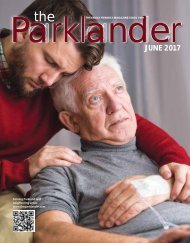You also want an ePaper? Increase the reach of your titles
YUMPU automatically turns print PDFs into web optimized ePapers that Google loves.
DIETICIAN’S VIEW<br />
Here are some of the more common challenges for aging people<br />
with diabetes mellitus that you will want to discuss with your<br />
provider:<br />
Vision Care: More than 28 percent of people over the age of<br />
40 living with diabetes experience diabetic retinopathy. Diabetic<br />
retinopathy is damage to the small blood vessels in the retina than<br />
can result in loss of vision. As people age their vision deteriorates,<br />
especially if blood glucose levels are uncontrolled. Cataracts can<br />
also contribute to poor vision. Poor vision makes it more difficult<br />
to read the directions on medications, to see blood glucose levels<br />
on a meter, or even to walk down stairs without falling. Have your<br />
vision checked regularly.<br />
Hearing Care: People with diabetes are twice as likely to experience<br />
hearing loss as those without diabetes, suggesting that it may<br />
be a complication of the disease. Hearing loss is a gradual process<br />
that occurs with age. All seniors should have their hearing checked<br />
on a regular basis, and those with diabetes should be diligent about<br />
this.<br />
CHALLENGES TO<br />
DIABETES CARE<br />
As you grow older<br />
By Nancy M. Ouhib, MBA, RDN, LDN<br />
Approximately one out of four Americans<br />
over the age of sixty have diabetes mellitus.<br />
Managing the disease can become more<br />
difficult as people enter their golden years.<br />
Two of the most important things aging people can do is admit<br />
they need help and ask for it. This applies to all medical conditions<br />
that may be pertinent. In regards to diabetes, a lot of people do not<br />
want to admit that they are not checking their glucose levels. If you<br />
find that you cannot comply with your self regimen, it is important<br />
to talk to your health care provider. Being honest will allow you to<br />
work together to come up with a system that is realistic for you. It<br />
is also important to let your provider know about any changes that<br />
your body is going through even if they seem minor to you. For<br />
example, you need to tell your physician if you are feeling weak,<br />
tired, or light-headed. Pay attention to your body, and when something<br />
does not feel right, you need to tell someone. The smallest<br />
change may be important to note for a person with diabetes.<br />
Technology: Technological advances are intended to make life<br />
simpler. These advances can actually make things more difficult for<br />
people who do not adapt well to changes in their medical devices<br />
or routines. There are devices in use now that track and record glucose<br />
levels over time. For a senior that does not understand how to<br />
operate the device, he may not know what the number registering<br />
on the device is for – whether it is today or seven days ago. It is best<br />
to get equipment that is as simple as possible. Make sure you ask<br />
your provider to explain to you how to use the device and practice<br />
in front of him/her until you are comfortable with it.<br />
Medication: Seniors should keep a card in their wallet listing<br />
what medications they are taking, how much and when. The same<br />
information should be available in the home in a visible location.<br />
Medications should be timed around meals or when a caregiver<br />
is available so that medications are taken as directed. Every effort<br />
should be made to accommodate the person’s restrictions and<br />
capabilities, so compliance can be achieved.<br />
Fine Motor Skills: The elderly struggle with fine motor skills,<br />
and these can be worsened by arthritis and vision problems. Daily<br />
diabetes self-care, such as picking up a test strip, loading a syringe<br />
or giving an injection, can be difficult and stressful. Family members<br />
need to be aware of this and make sure a caregiver is available<br />
to assist with these tasks.<br />
Stay Active: Aging joints, shortness of breath, slower movement,<br />
and fear of falling can discourage seniors from being active when,<br />
in fact, in most cases they need to remain active. Being sedentary<br />
only worsens the above challenges. People should always check<br />
with their provider regarding their exercise and activity level based<br />
on their medical conditions.<br />
Altering your diabetes care routine can help you to focus on safety,<br />
health, and less stress. This allows you to improve your daily function<br />
and quality of life. P<br />
94<br />
FEBRUARY <strong>2015</strong>


















